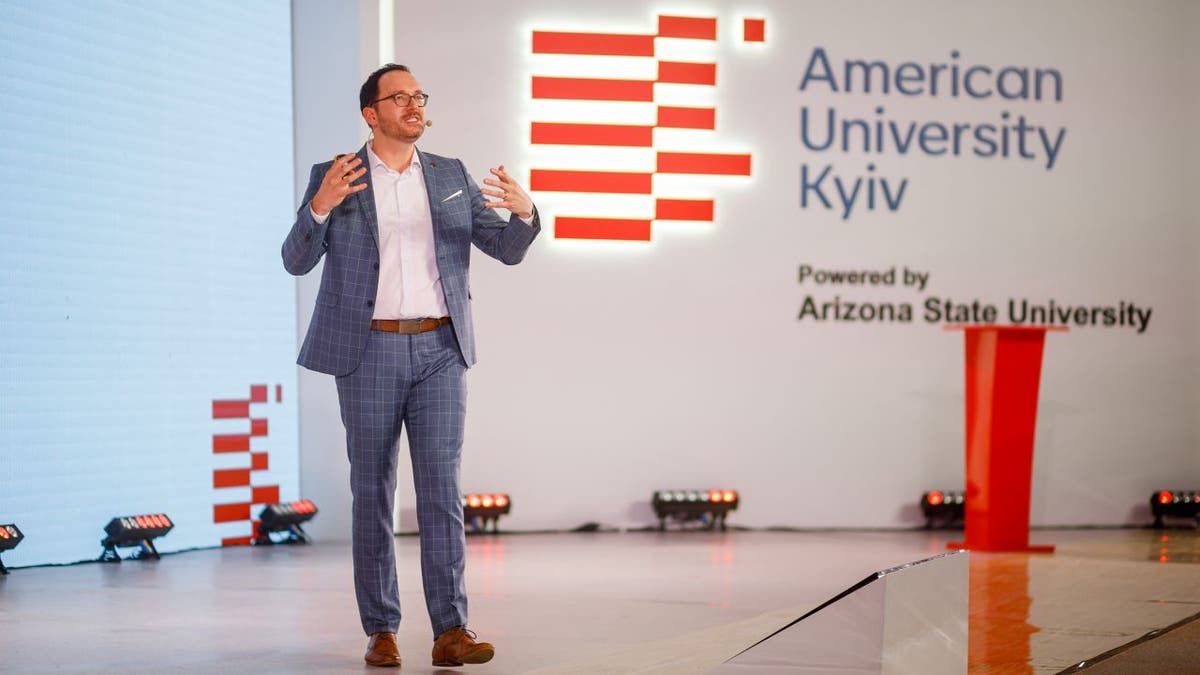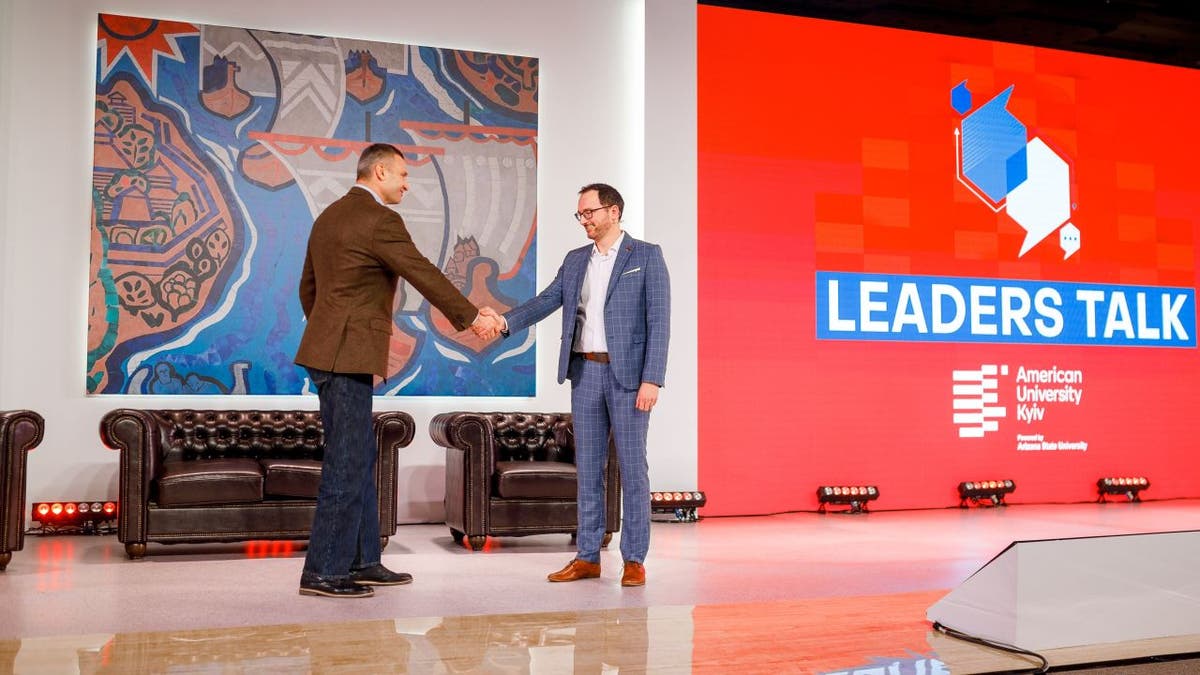Ukraine defeating Russia is 'not a question': Mariya Soroka
Mariya Soroka, a Ukrainian living in the U.S., provides details on what measures her father and other Ukrainians are taking to combat Russia on 'The Story.'
As Russia continues to attack Ukraine, many Ukrainians and Ukrainian Americans have been reflecting on the country’s independence, which notably reached a 30th-anniversary milestone in August.
Roman Sheremeta, a professor of economics at Case Western Reserve University in Cleveland, Ohio, is one of many Ukraine-born citizens who remember what life was like when the country was under Soviet Union rule and how it changed after Ukraine signed its Declaration of Independence.
"I was born in 1982, so I was 9 years old when Ukraine got its independence," Sheremeta told Fox News Digital, during a phone interview.
"I remember standing with my mom in lines to get butter," he continued. "We had coupons. I remember holding these coupons and counting how many pieces of butter we're going to get for our family."
RUSSIA INVADES UKRAINE: LIVE UPDATES
If families needed an item that was scarce – which many Ukrainians called a "deficit" good at the time – bribes or connections were usually necessary to obtain the deficit item, Sheremeta recalled.
Sheremeta continued, "Everything was the same pretty much. Everybody wore the same pants, the same clothes. We all lived in the same apartments. It had been a copy-paste system at all."

Roman Sheremeta, a professor of economics at Case Western Reserve University and a founding director of American University Kyiv, is one of many Ukraine-born citizens who remember what life was like when the country was under Soviet Union rule and how it changed after Ukraine signed its Declaration of Independence. (American University Kyiv)
While Sheremeta was still a child when Ukraine gained its independence from the Soviet Union on Aug. 24, 1991, he recalls his grandfather Ivan Savchuk (alternate spelling: Ivan Sawchuk) was involved with the signing of Ukraine’s Declaration of Independence. Sheremeta also remembers "a big part" of his family had to flee to Canada to escape Soviet persecution.
Sheremeta told Fox News Digital that his family "suffered" under Soviet rule and persecution, but it didn’t stop them from being "freedom fighters for Ukrainian freedom."
UKRAINE ASKS TWITTER USERS TO SPAM RUSSIA WITH THOUGHTS ON THE WAR: 'TELL THEM WHAT YOU THINK'
On the actual Independence Day of Ukraine, Sheremeta remembers his mother, his grandfather and a number of his Ukrainian Canadian relatives traveled to Kyiv – Ukraine’s capital city – and proudly carried a "huge Ukrainian flag."
The celebration was "big" and seemed to be "everywhere" in Kyiv as citizens took to the streets to show their support for independence, Sheremeta recalled.
"Right away we were thinking and talking about what kind of money we're going to have, because obviously, we had to switch the currency," Sheremeta said. "I remember a lot of joy."
"I remember us throwing away those stars because it was so symbolic that we finally don't have to be told what to do"
Other standout memories Sheremeta has from that day include Ukrainians throwing out their red Soviet Pioneer neckties and star-shaped pins that featured the face of Soviet Union Premier Vladimir Lenin, which were required uniform accessories for schoolchildren at the time.
"I remember us throwing away those stars because it was so symbolic that we finally don't have to be told what to do," Sheremeta said.
UKRAINIAN YOUTH GROUPS AND SCHOOLS HOLD PRAYER VIGILS, PEACE RALLIES IN RESPONSE TO WAR
As a child, Sheremeta noticed the shift independence had on Ukraine when American chocolate bars became more accessible instead of being reserved for special holidays and when American cartoons like "DuckTales" and "Chip 'n' Dale" began airing on Ukrainian TV.
"It was unbelievable," Sheremeta recalled. "We never had anything like this."
When asked if Ukrainian independence has lived up to expectations, Sheremeta told Fox News Digital that there have been economic, social and political struggles Ukraine has faced in the last three decades as a young country, but he noted that there has been significant growth as well.

Roman Sheremeta tells Fox News Digital he was 9 years old when Ukraine got its independence on Aug. 24, 1991. (American University Kyiv)
Early on, wealth got concentrated in the hands of a few "well-connected" families who bought company shares from Ukrainians who didn’t know what to do with the assets that were given to them after the country achieved its independence, according to Sheremeta.
This economic shift led to the privatization of corporations with minimal market competition, he said, which has made some citizens question capitalism on occasion.
"In most democracies and with people around the world, they fight for their democracy, and there’s a lot of bloodshed," Sheremeta said. "Ukraine in 1991, didn't have that. We were handed that for free… I think to a certain extent, we did not know what to do with democracy because it was handed to us. And so because of that, we made a lot of mistakes as a country."
UKRAINE REFUGEES TO RECEIVE HELP FROM FRANKLIN GRAHAM'S HUMANITARIAN AID NONPROFIT
In recent years, Sheremeta said Ukrainians have mostly moved away from having a "Soviet mentality" as the country has seen more success with democracy and its market economy.
Ukraine has built itself up with new profitable companies, especially in the sphere of information technology.
"In most democracies and with people around the world, they fight for their democracy, and there’s a lot of bloodshed"
"Ukraine has really propelled the further we got away from Russia," Sheremeta told Fox News Digital. "A lot of people got much wealthier. There was a development of a middle-class people."
"This is past 2014. That's where things started to pick up," he continued. "And we have established a lot of great companies that went public in the states and have done tremendously." Some of the founders of the biggest companies in the U.S., like even Google, and others, will have a significant trace of Ukrainian talent in them. That has been, again, a new legacy of Ukraine."
UKRAINIAN BISHOP SAYS UKRAINE IS KEEPING FAITH IN RELIGION AND FREEDOM
Sheremeta noted that Ukraine’s growth has been achieved "despite the constant pressure" of Russian aggression led by President Vladimir Putin, who has actively tried to discourage the "Western ideology of democracy and free markets" in Ukraine and neighboring countries.
He went on, "Ukraine has done really well. And, obviously, for Putin, that has been a stumbling block, and he needed to create a narrative that, ‘If you want to go with the west, look what's what is going to happen to you, you are not going to have a successful country, and the west is not going to help you either."
"A successful Ukraine is a nail in the coffin of Putin’s regime"
Sheremeta said Ukraine’s desire to join North Atlantic Treaty Organization (NATO) also plays a part in Russia’s attack because Putin doesn’t want the alliance expanded, but he questions whether the Russian leader would attempt to attack Finland and Sweden – which are two countries that haven’t disavowed NATO.
"A successful Ukraine is a nail in the coffin of Putin’s regime," Sheremeta said. "If Ukraine can establish a precedent of being a successful country because it went with democracy, it went with free markets, then that will be the final nail in the fall of the Soviet Union, which obviously Putin has been trying to restore. So, it's a fight between two different civilizations and Ukraine, unfortunately, is at the crossroad of that."
CLICK HERE TO GET THE FOX NEWS APP
Sheremeta, who is the founding director of American University Kyiv, told Fox News Digital that he believes the Russia-Ukraine war is "the most crucial battle of our century" because it’s the battle of world view and democracy.

Roman Sheremeta (right) tells Fox News Digital that Ukrainians will not give up their freedom in face of the Russia-Ukraine war. (American University Kyiv)
He went on to say that Ukrainian resistance has shown the world that "Putin and his regime is not as scary as everybody thought" and "he can be beaten" even with Russian forces shelling Ukrainian cities.
"I see Americans, I see people from around the world, gathering in hundreds and hundreds of thousands of people across the globe in support of Ukraine"
Sheremeta noted that countries that seemed to have doubted Ukraine after Russia’s initial attack on Thursday, Feb. 24, have already switched their stances and are providing Ukraine military aid following the country’s strong defense.
"Ukrainian people will not give up," Sheremeta said while pointing out people of all ages and industries have taken up arms to defend their country.
FOLLOW US ON FACEBOOK FOR MORE FOX LIFESTYLE NEWS
"The world is 100% united behind Ukraine now, which is an incredible accomplishment of Putin," Sheremeta told Fox News Digital. "There's never been so much support for Ukraine. I walk everywhere on the streets [of Cleveland] and I see the flags. I see Americans, I see people from around the world, gathering in hundreds and hundreds of thousands of people across the globe in support of Ukraine."
Sheremeta said, "This is a fight that Putin cannot win. Ukraine will win. The question is, ‘At what price and how much the West is going to be involved?’"

